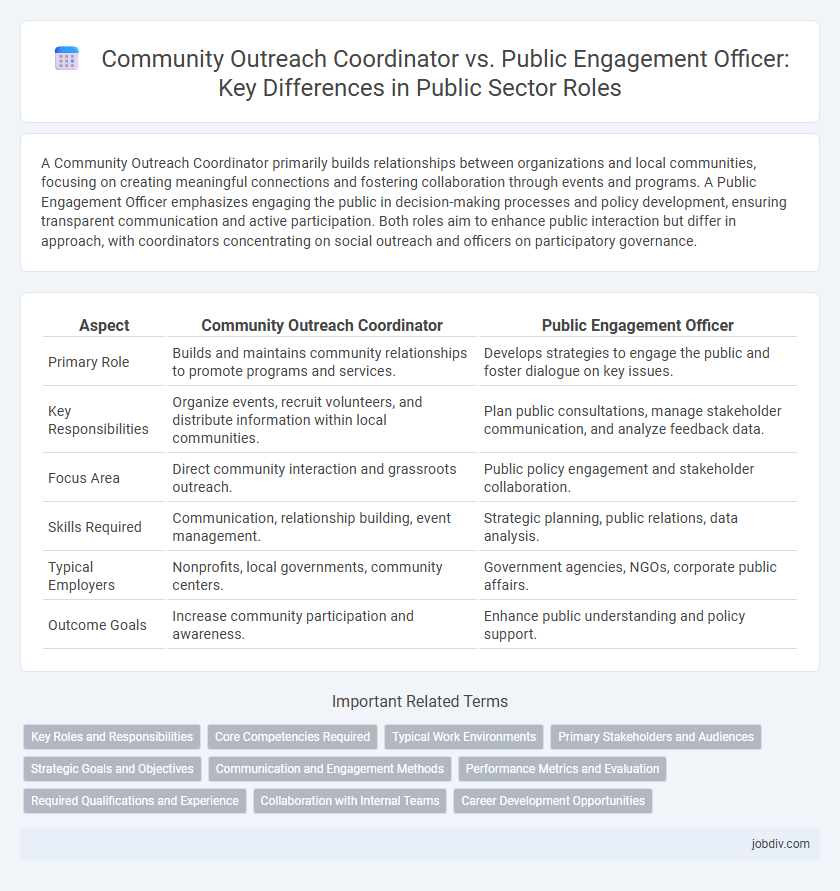A Community Outreach Coordinator primarily builds relationships between organizations and local communities, focusing on creating meaningful connections and fostering collaboration through events and programs. A Public Engagement Officer emphasizes engaging the public in decision-making processes and policy development, ensuring transparent communication and active participation. Both roles aim to enhance public interaction but differ in approach, with coordinators concentrating on social outreach and officers on participatory governance.
Table of Comparison
| Aspect | Community Outreach Coordinator | Public Engagement Officer |
|---|---|---|
| Primary Role | Builds and maintains community relationships to promote programs and services. | Develops strategies to engage the public and foster dialogue on key issues. |
| Key Responsibilities | Organize events, recruit volunteers, and distribute information within local communities. | Plan public consultations, manage stakeholder communication, and analyze feedback data. |
| Focus Area | Direct community interaction and grassroots outreach. | Public policy engagement and stakeholder collaboration. |
| Skills Required | Communication, relationship building, event management. | Strategic planning, public relations, data analysis. |
| Typical Employers | Nonprofits, local governments, community centers. | Government agencies, NGOs, corporate public affairs. |
| Outcome Goals | Increase community participation and awareness. | Enhance public understanding and policy support. |
Key Roles and Responsibilities
Community Outreach Coordinators focus on building relationships with local groups and organizing events to promote awareness and participation. Public Engagement Officers develop and implement strategies to involve the public in governmental or organizational decision-making processes through consultations and communications. Both roles aim to foster community involvement but differ in their target audiences and engagement methods.
Core Competencies Required
Community Outreach Coordinators require strong interpersonal and communication skills to effectively connect with diverse populations, alongside project management and event planning expertise. Public Engagement Officers need advanced skills in stakeholder analysis, strategic communication, and policy advocacy to facilitate collaboration between organizations and the public. Both roles demand cultural sensitivity, problem-solving abilities, and proficiency in digital engagement tools for successful community interaction and program implementation.
Typical Work Environments
Community Outreach Coordinators typically work within nonprofit organizations, local government agencies, and community centers where direct interaction with diverse populations is essential. Public Engagement Officers are often employed by municipal governments, public institutions, and corporate social responsibility departments, focusing on policy communication and stakeholder collaboration. Both roles frequently require fieldwork but differ in settings, with Coordinators engaging more at grassroots levels and Officers operating within formal organizational frameworks.
Primary Stakeholders and Audiences
Community Outreach Coordinators primarily engage local residents, nonprofit organizations, and grassroots groups to foster community participation and address neighborhood needs. Public Engagement Officers focus on broader audiences including government agencies, corporate partners, and the general public to facilitate transparent communication and stakeholder collaboration. Both roles prioritize building trust and enhancing dialogue but target different stakeholder segments for tailored engagement strategies.
Strategic Goals and Objectives
Community Outreach Coordinators prioritize building grassroots connections and fostering local partnerships to drive community participation aligned with organizational strategic goals. Public Engagement Officers focus on designing and implementing comprehensive engagement strategies that enhance stakeholder involvement and support broader public policy objectives. Both roles are essential for meeting strategic goals, with Outreach Coordinators emphasizing direct community impact and Engagement Officers targeting systemic engagement and communication.
Communication and Engagement Methods
Community Outreach Coordinators specialize in direct, grassroots communication strategies, including organizing local events, face-to-face interactions, and leveraging community networks to foster relationships and gather feedback. Public Engagement Officers focus on broader communication methods such as digital campaigns, social media engagement, public consultations, and multimedia content to reach diverse audiences and encourage inclusive participation. Both roles prioritize transparent messaging and interactive dialogue but differ in scale and tools used to maximize community involvement.
Performance Metrics and Evaluation
Community Outreach Coordinators typically measure success through direct engagement metrics such as event attendance, volunteer recruitment, and community feedback surveys to evaluate program effectiveness. Public Engagement Officers often use more comprehensive performance indicators, including digital analytics, stakeholder satisfaction scores, and policy impact assessments to gauge public involvement strategies. Both roles prioritize data-driven evaluation but differ in scope and focus, with coordinators emphasizing grassroots impact and officers targeting broader public interaction outcomes.
Required Qualifications and Experience
Community Outreach Coordinators typically require a bachelor's degree in social sciences, communications, or related fields, along with experience in grassroots organizing or nonprofit work, emphasizing relationship-building and local community knowledge. Public Engagement Officers often hold qualifications in public relations, political science, or urban planning, paired with experience in policy advocacy, stakeholder communication, and event management to foster public participation and transparency. Both roles demand strong interpersonal skills, but Public Engagement Officers generally require a deeper understanding of governmental or institutional frameworks.
Collaboration with Internal Teams
Community Outreach Coordinators collaborate closely with marketing, communications, and program development teams to align outreach efforts with organizational goals. Public Engagement Officers work alongside policy, research, and stakeholder relations divisions to ensure public input shapes decision-making processes effectively. Both roles require seamless internal collaboration to foster cohesive messaging and maximize community impact.
Career Development Opportunities
Community Outreach Coordinators often advance by gaining expertise in grassroots organizing and local partnerships, leading to roles such as Program Manager or Director of Community Relations. Public Engagement Officers typically enhance skills in stakeholder communication and policy advocacy, paving the way for careers in government affairs or strategic communications. Both positions offer career development opportunities centered on expanding influence in public policy and community involvement sectors.
Community Outreach Coordinator vs Public Engagement Officer Infographic

 jobdiv.com
jobdiv.com